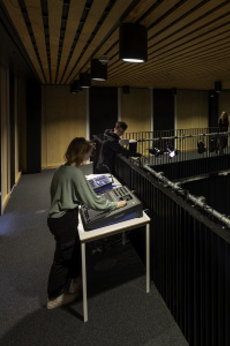Article #10: The Pedagogical Actor

I never really wanted to be a teacher. My true ambition was to be on stage and make my living by becoming a professional actor. I felt that that there was something terribly exciting about being on stage, with its glorious lights and sounds. However, thespianism was not part of the divine plan for me and as fate would have it, I enrolled in a B.Ed programme and became a teacher in the end.
As time passed, I began to realise that being a teacher is not very much different than being an actor. While an actor performs on a stage, be it a proscenium or a three-quarter arena, a teacher’s stage is his or her classroom Although a teacher’s script each day may not be Shakespeare’s Macbeth or A. Samad Said’s Salina, what a teacher does in class is not very different from what an actor does on stage.
While on stage, an actor requires concentration. An actor has to sustain the audience’s concentration and maintain his or her own concentration throughout the performance in order to stay in character for the whole duration of the play. Similarly, a teacher needs to do this as well when teaching in the classroom. He or she needs to concentrate on the task at hand and sustain the students’ concentration on the lesson. This may include eliminating distractions which comes from external sources.
Another aspect that is crucial in the craft of acting is dramatic action. An actor needs to incorporate movement in his or her performance to ensure the effective delivery of the dialogue. Likewise, a teacher should also have the ability to move in the classroom and incorporate appropriate movement with the appropriate speech or instructions. A ‘stationary’ teacher is not very effective and may encounter difficulty in sustaining students’ interest in the classroom.
Characterisation is another important craft of acting. An actor needs to understand the character he or she is portraying comprehensively. In this respect, a teacher also needs to be ‘in character’ in the classroom every day. A teacher should have the ability to ‘switch’ characters according to the situation and demands in the classroom. In acting, this skill in known as tuning and it is a very useful skill for both actor and teacher.
An actor should also possess the skill of observation. A good actor is a very good observer and is often very sensitive to his or her surroundings. Like actors, teachers also need to be very good observers. A teacher should be totally aware of his or her students and has the ability to carefully observe the students, especially for changes in students’ behaviour e.g. loss of interest or sudden bursts of excitement.
Finally, both actor and teacher need to understand the rhythm of their environment, be it the stage or the classroom.
The teacher/actor is aware of the rhythm or structure of his subject and he is able to transmit this awareness to the audience. The teacher/actor feels and transmits a rhythm, a sense of wholeness and interrelation, in each of his lessons, and he varies his tempo in accord with the needs of his class, his content and himself (Smith and Hansen 1972:98).
In conclusion, the craft of an actor and a teacher share many similarities. Although performing in a classroom may not be as glamorous and flamboyant as on stage, a teacher is in every sense of the word an ‘actor’.
References
Smith, R.L. and Hansen, J.M. (1972) ‘The Teacher/Actor’ The Clearing House [online] 47(2), 96-98. available from http://www.jstor.org/stable/30184548?seq=1#page_scan_tab_contents [26 March 2018]
Contributed by
Yuhana Mohd Yusof